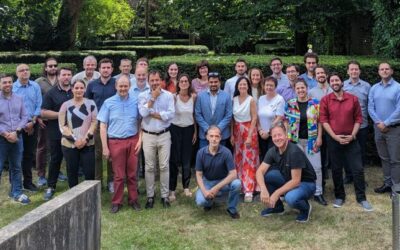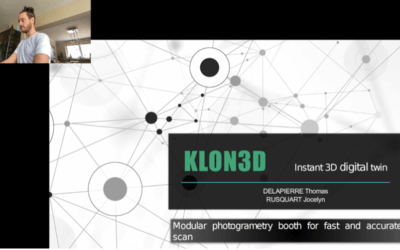On 4 June 2021, partner CERTH, represented by Ria Pechlivani, along with with Mrs. S. Valsamaki (President of the Parents Association Schools, Municipality of Chalkidona) successfully co-organised and chaired the 2nd Greek online workshop titled “Digital Technologies in Education & Culture”. The objectives of this workshop were to:
- Raise awareness on DIY activities, and Co-Design and Co-Creation concepts
- Demonstrate 3D printing & AR/VR experiences to enhance educational purposes so that the children can visualize and “touch” history and culture
- Reinforce stakeholders and students to get familiar with digital technologies and adopt them in real-life settings
- Present the digital tools developed through iPRODUCE project on how they can support educational and cultural purposes and increase awareness
- Promote on-line demonstration and training activities on 3D printing technologies to students, teachers and parents
The workshop was attended by more than 40 participants, including attendees form the local and regional ecosystem, such as students (from high school, middle school and fifth and sixth grade elementary schools), teachers/ educators, parents and representatives from guardians’ associations, researchers and local stakeholders related to educational and cultural field.
The online event showcased the ongoing work and existing practices within the domain of digital technologies integrated in the educational and cultural field, by bringing together teachers, students, researchers and scientists. The invited speakers from AMU CERTH-ITI, Varlab CERTH-ITI, Municipality of Chalkidona, American Farm School, and AidPlex, presented a selection of ongoing co-creation and co-design activities under Greek local ecosystem.
More specifically, Ria Pechlivani presented “3D Printing in Education & Culture”, by demonstrating examples of applications in several courses such as mathematics, arts, biology, chemistry, geography, history, informatics, physics, mechanics, robotics, fashion, theatre, restoration and preservation, reconstruction, drawing, photography, and electronics, among others, and summarised key achievements of past and present projects accomplished by ITI/CERTH related to this field within the framework of the iPRODUCE project.
Then, the attendees of the workshop had the opportunity to be guided at AMU’s state-of-the-art 3D printing infrastructures via a virtual tour performed by Mrs. T. Kontodina, who demonstrated AMU’s latest innovative 3D Printed Smart Prototypes, Services & Products, especially the two use case scenarios of the 3D printed smart luminous artefacts and the 3D printed (bio) scaffolds developed during iPRODUCE project.
Additionally, the team of iPRODUCE, namely research assistants from the Varlab of CERTH/ITI presented their revolutionary work in systemic innovation of digital technologies as artificial intelligence, IoT and augmented and virtual reality. In particular, they demonstrated the tools developed for iPRODUCE digital Open Innovation Space (OpIS), in order to support open innovation methods and practices, and provided stakeholders all the corresponding services and facilities. The three main topics are the following:
- “Augmented Reality in Education”, presented by Mr. Georgios Chatziaras
- “Virtual Reality and Augmented Reality – Enhancement Tool for Co-creation”, analyzed by Mr. Stavros Tranidis
- “Smart Contracts – Enhancement Tool for Innovation”, demonstrated by Mr. Charalampos Tsotakis.
Lastly, Mr. Dimitris Moustakas (co-founder of AidPlex) presented the company’s products and their manufacturing process, with regard to four specific use case scenarios developed through iPRODUCE project, namely IoT-based orthopaedic back brace for adolescent Scoliosis & Kyphosis, splints for fractures, splints for pets and customised face shields. Furthermore, he mentioned how 3D printing can benefit orthopaedics and healthcare in general.
With regard to the outcomes and impact of the workshop, it is considered that it contributed to raise awareness of stakeholders on digital tools and digital manufacturing by promoting the concept of co-design and initiating co-creation activities; increased educational and cultural heritage fields by incorporating 3D printing and AR/VR technologies; and increased the impact of dissemination activities in order to promote the achievements of iPRODUCE project and seek for additional exploitation opportunities.





